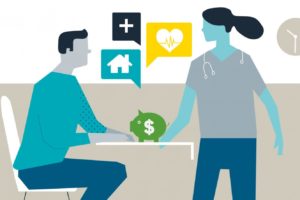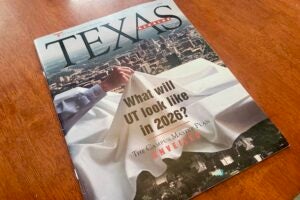When Dr. Michael Hole was a pediatrician in Boston, he discovered a key to unlocking a healthier future for many families – help with taxes.

“Simply put, wealth is health,” says Hole. “Poverty can have negative impact on a child’s health and learning.”
Hole is a new joint faculty member at The University of Texas at Austin’s LBJ School of Public Affairs and Dell Medical School, and he is a co-founder of StreetCred, a national nonprofit helping low-income families file taxes, claim refunds and build wealth in a trusted, underused space: pediatricians’ waiting rooms.
Hole believes helping his patients’ families get more money in their pockets will improve their lives more than a standard check-up can. Many need help – 1 in 5 families eligible for the Earned Income Tax Credit do not claim the assistance. During the past two years, StreetCred has returned more than $1.6 million to about 800 families, including 2,000 children.
Hole started the program in Boston in 2016. StreetCred is now offering free help this tax season at nine clinics nationally, including two in Austin at People’s Community Clinic North and CommUnity Care Southeast Health & Wellness Center.
We spoke with Hole about how taxes are linked to our health, why so few families take advantage of available credits and what changes could improve our futures and our wallets.
How are taxes, health and public policy connected?
MH: Medicines do very little for hunger, homelessness, low income and many other social problems known to affect health.
If we’re to improve health and curb health care costs, addressing economic disparities and other social determinants of health will be core to solutions.
How did you get the idea to offer tax help as a doctor?
MH: When I was pediatrician in Boston, I was speaking to a patient’s mom about her trouble filing her taxes at a tax prep center: unreliable public transportation on two buses and a train across town, confusing tax paperwork, expensive fees, and so on.
She asked me a question, which was the impetus for StreetCred. She said: “I waited on you for 30 minutes today. Why can’t we just do my taxes here?” One year later, StreetCred filed her taxes for free at the doctor’s office.
What are tax credits?
MH: Generally speaking, tax credits are money given to taxpayers based on specific criteria, such as income, marital status and number of dependents. The Earned Income Tax Credit (EITC), in particular, offers more than $66 billion in annual tax refunds and is one of the few antipoverty government programs in the U.S. often enjoying bipartisan support. The EITC encourages and rewards employees and is tied to improved health, education and workforce productivity.
Do you think they are working as well as they could be?
MH: Despite certain triumphs, the EITC’s impact is dampened by two challenges. First, an estimated 20 percent of families eligible for the EITC do not receive the credit yearly because they lack awareness of the benefit, misunderstand their eligibility, or face access barriers, such as time and transportation constraints. Second, low-income families already strapped for funds are losing nearly $2 billion of tax credit annually to the for-profit tax preparing services.
How do these credits impact American health?
MH: These tax credits are a social determinant of health. The money from the credit is used to pay for debts, utilities, fresh groceries, new clothes, rent and transportation, all of which impact health, functioning, risks and quality of life for these families. Tax credits such as the Earned Income Tax Credit (EITC) are linked to improved infant birth weight, less maternal stress, higher employment rates of single mothers, improved school performance and increased future earnings. Combined with the Child Tax Credit, the EITC lifts about 32 million persons, including 13 million children, from poverty yearly.
Should learning about this be part of the medical training?
MH: I think doctors, as patients’ most trusted allies, can and should lead these discussions. I think doctors should learn how to treat asthma, while also learning how to best advocate for safer housing. That is a core part of Dell Med’s new curriculum and the collaboration with the LBJ School.
Who is working to help file the taxes at StreetCred?
MH: Many StreetCred volunteers are students: undergraduates, medical students and graduate students from UT’s various schools. Some earn IRS certification and actually prepare clients’ tax returns in our health clinics, while others help us with client outreach, fundraising, data evaluation and interpreting for non-English speakers.
I hope StreetCred inspires young Longhorns to apply their UT education for social good — to build careers, regardless of industry, they can use to help the world’s most vulnerable people.
Do you have any tips for people applying for taxes now? Or how to prepare for next year?
Taxes can be confusing, so ask for help early and often to make sure you get back all the money you’ve earned. And StreetCred isn’t the only free, professional tax preparation in Austin. We work closely with Foundation Communities, a local nonprofit with several nearby tax prep sites.




